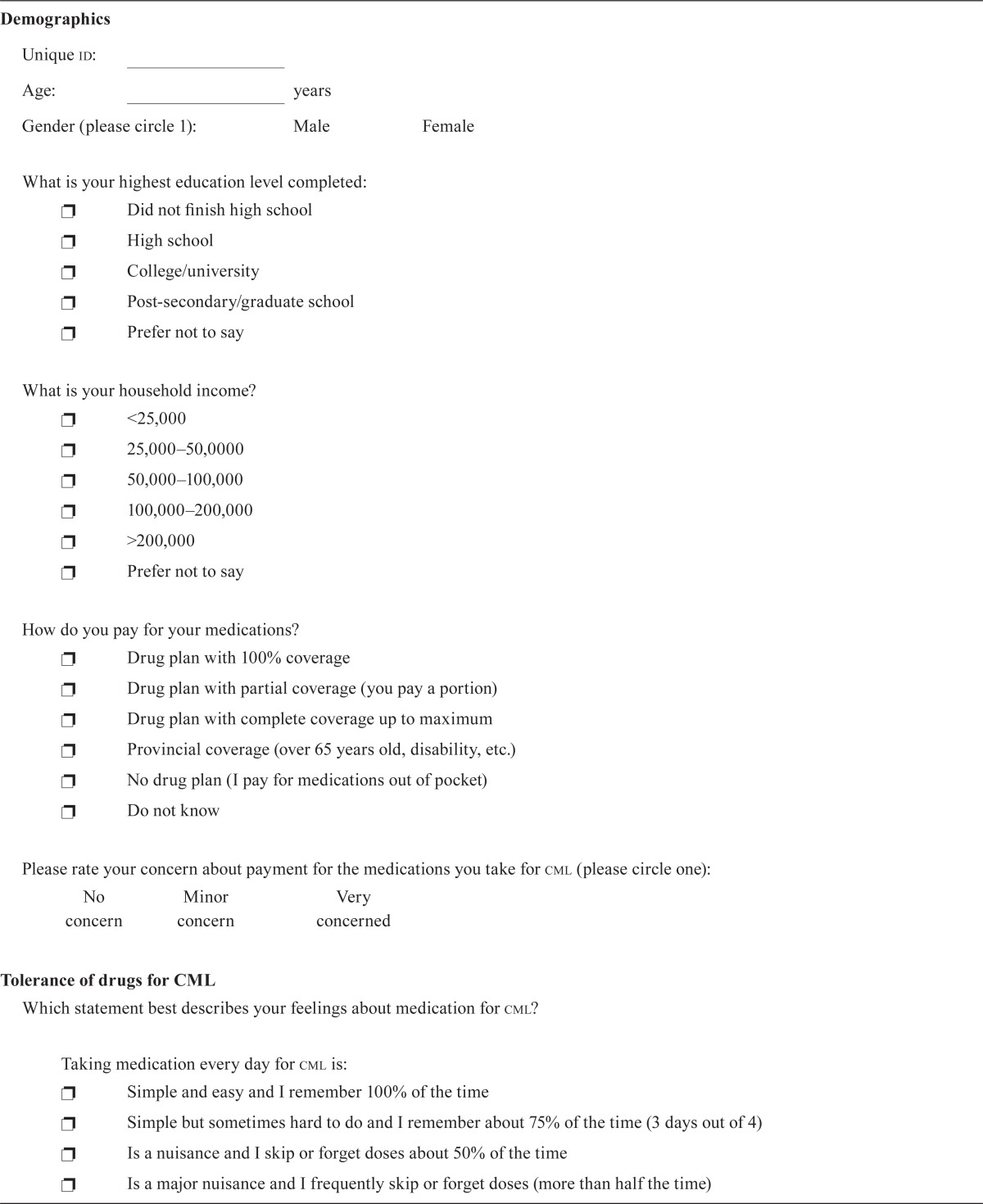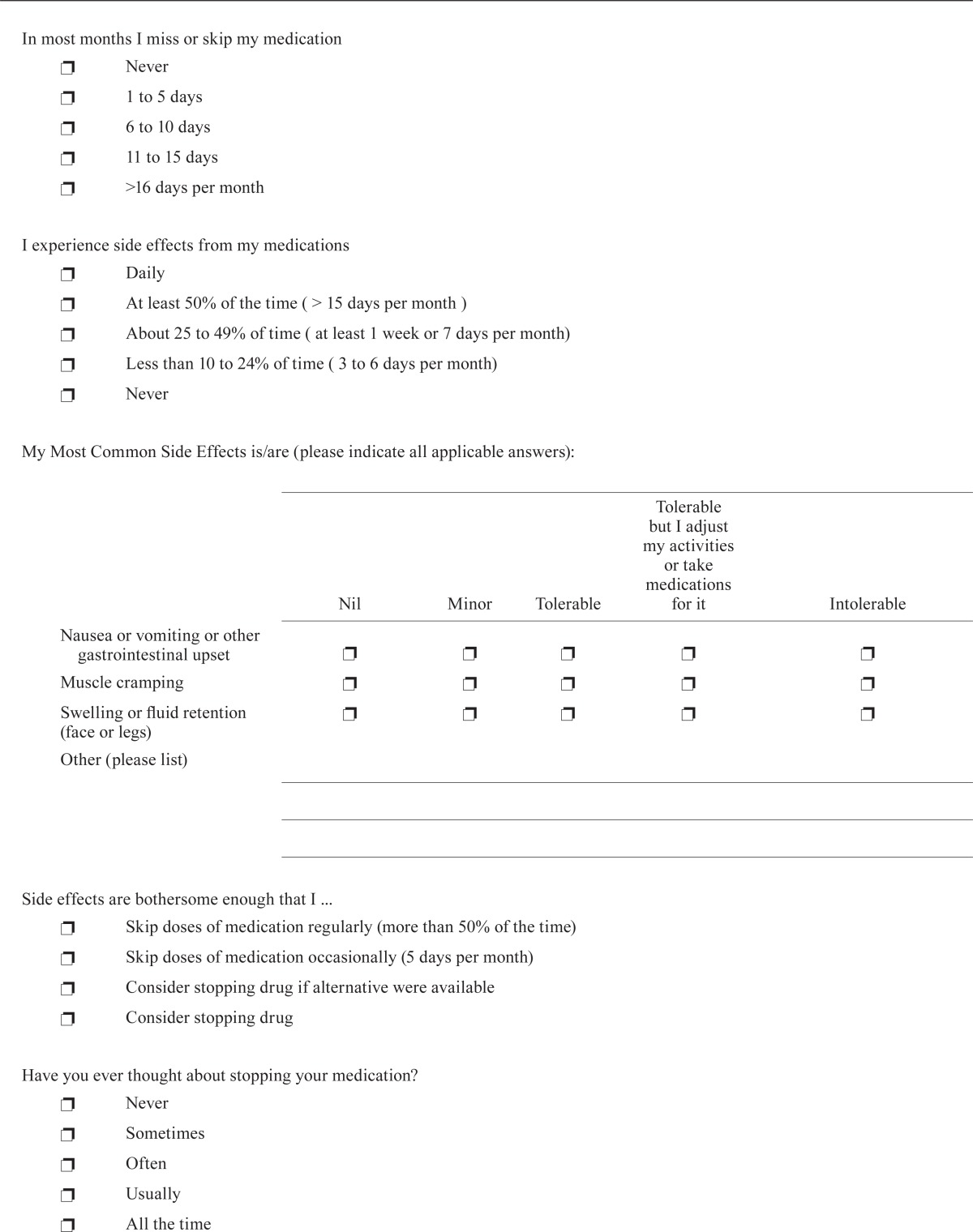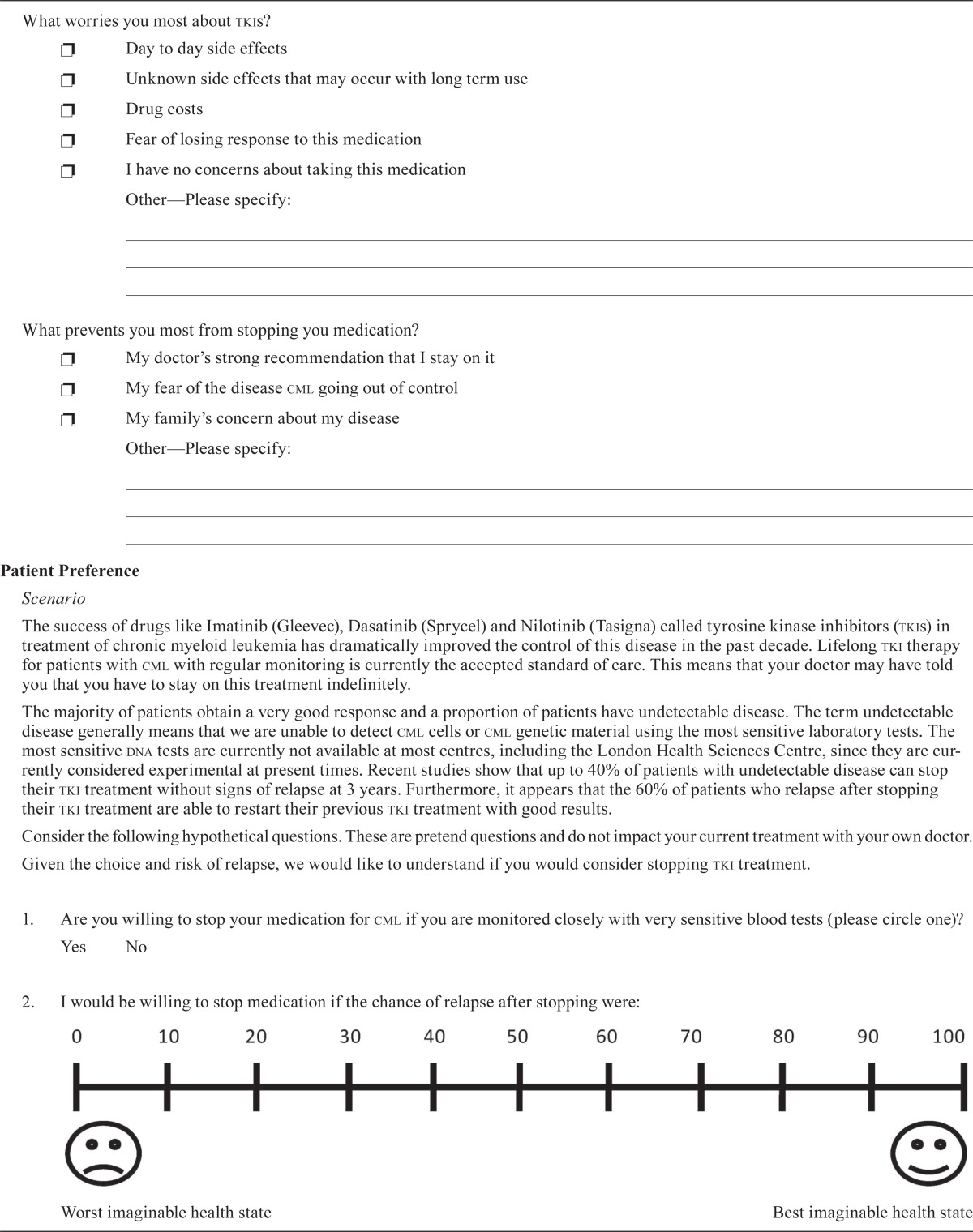APPENDIX A:
SURVEY OF PATIENT PREFERENCES FOR DISCONTINUING TYROSINE KINASE INHIBITORS IN CHRONIC MYELOID LEUKEMIA



| Demographics | |||||
| Unique id: ______________________ | |||||
| Age: _______________ years | |||||
| Gender (please circle 1): | Male | Female | |||
What is your highest education level completed:
| |||||
What is your household income?
| |||||
How do you pay for your medications?
| |||||
| Please rate your concern about payment for the medications you take for cml (please circle one): | |||||
| No concern | Minor concern | Very concerned | |||
| Tolerance of drugs for CML | |||||
| Which statement best describes your feelings about medication for cml? | |||||
Taking medication every day for cml is:
|
|||||
In most months I miss or skip my medication
| |||||
I experience side effects from my medications
| |||||
| My Most Common Side Effects is/are (please indicate all applicable answers): | |||||
| ________________________________________________________ | |||||
| Nil | Minor | Tolerable | Tolerable but I adjust my activities or take medications for it | Intolerable | |
|
| |||||
| Nausea or vomiting or other gastrointestinal upset | ❐ | ❐ | ❐ | ❐ | ❐ |
| Muscle cramping | ❐ | ❐ | ❐ | ❐ | ❐ |
| Swelling or fluid retention (face or legs) | ❐ | ❐ | ❐ | ❐ | ❐ |
| Other (please list) | __________________________________________________________________ | ||||
| __________________________________________________________________ | |||||
| __________________________________________________________________ | |||||
Side effects are bothersome enough that I ...
| |||||
Have you ever thought about stopping your medication?
| |||||
What worries you most about tkis?
| |||||
| Other—Please specify: ____________________________________________________________________ ____________________________________________________________________ ____________________________________________________________________ | |||||
What prevents you most from stopping you medication?
| |||||
| Other—Please specify: ____________________________________________________________________ ____________________________________________________________________ ____________________________________________________________________ | |||||
| Patient Preference | |||||
| Scenario | |||||
| The success of drugs like Imatinib (Gleevec), Dasatinib (Sprycel) and Nilotinib (Tasigna) called tyrosine kinase inhibitors (tkis) in treatment of chronic myeloid leukemia has dramatically improved the control of this disease in the past decade. Lifelong tki therapy for patients with cml with regular monitoring is currently the accepted standard of care. This means that your doctor may have told you that you have to stay on this treatment indefinitely. | |||||
| The majority of patients obtain a very good response and a proportion of patients have undetectable disease. The term undetectable disease generally means that we are unable to detect cml cells or cml genetic material using the most sensitive laboratory tests. The most sensitive dna tests are currently not available at most centres, including the London Health Sciences Centre, since they are currently considered experimental at present times. Recent studies show that up to 40% of patients with undetectable disease can stop their tki treatment without signs of relapse at 3 years. Furthermore, it appears that the 60% of patients who relapse after stopping their tki treatment are able to restart their previous tki treatment with good results. | |||||
| Consider the following hypothetical questions. These are pretend questions and do not impact your current treatment with your own doctor. | |||||
| Given the choice and risk of relapse, we would like to understand if you would consider stopping tki treatment. | |||||
| 1. Are you willing to stop your medication for cml if you are monitored closely with very sensitive blood tests (please circle one)? | |||||
| Yes | No | ||||
2. I would be willing to stop medication if the chance of relapse after stopping were:
| |||||
3. If my disease relapses after stopping medication, we know that almost all patients respond to restarting the same pills. Knowing this, I would be willing to stop medication if the chance of relapse after stopping were:
| |||||
| 4. If my disease relapses after stopping medication and I were to restart a medication for cml, how likely are you to take your medications every day: | |||||
| Very unlikely | Unlikely | Neither unlikely nor likely | Likely | Very likely | |
| 5. In the following questions, if the risk of relapse is different, how likely are you to stop mediations for your cml? | |||||
| If the risk of relapse were 20%? | |||||
| I would absolutely stop | I would likely stop | I would be neutral | I would likely not stop | I would absolutely not stop | |
| If the risk of relapse were 60%? | |||||
| I would absolutely stop | I would likely stop | I would be neutral | I would likely not stop | I would absolutely not stop | |
| If the risk of relapse were 40%? | |||||
| I would absolutely stop | I would likely stop | I would be neutral | I would likely not stop | I would absolutely not stop | |
| If the risk of relapse were 80%? | |||||
| I would absolutely stop | I would likely stop | I would be neutral | I would likely not stop | I would absolutely not stop | |
| 6. Are any of the following factors concerns about stopping treatment? (Yes or No) | |||||
| |||||
cml = chronic myeloid leukemia; tki= tyrosine kinase inhibitor.
